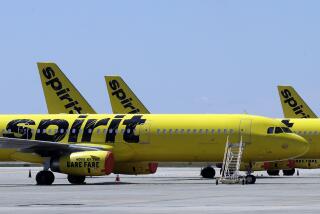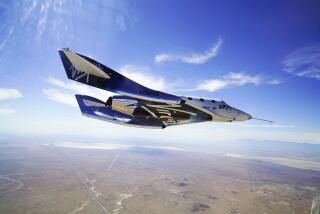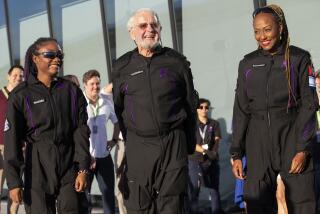A bumpy takeoff
- Share via
IT SURE TOOK A LONG time for billionaire Richard Branson to scrape together $177 million from investors to start a low-fare Virgin airline in the U.S., but it wasn’t his fault. He could have easily paid the start-up costs for the airline out of his own pocket. But because of a stubbornly guarded Depression-era law, one seemingly insignificant technicality -- he’s a British citizen -- kept Branson from forming his own low-cost airline the easy way.
Virgin America, based near San Francisco, applied Dec. 8 to the Department of Transportation to start domestic passenger service in 2006. Virgin America devoted a good portion of the application to branding itself a “U.S. citizen,” and it portrayed Branson as an insignificant player, even though the airline bears his well-known Virgin brand.
That’s because Virgin America would never be allowed to fly if Branson -- or any other noncitizen -- had a larger role in running the airline. A 1938 law restricts foreign control of a carrier to no more than 25% of its voting stock. When Branson started talking publicly in 1998 about launching an airline in the United States, he knew the foreign ownership ban would be a major obstacle, so he lobbied government regulators to relax the 25% cap. But in 2003, the last time Congress took up the issue, it caved in to union fears about foreign ownership. Virgin America is, in fact, owned and operated by U.S. nationals, and its inception marks the first time Virgin has licensed its name without ever having much control over the business. It’s lamentable Branson had to go to such lengths and that Virgin’s application may still elicit scrutiny from competitors eager to find holes in the airline’s claim of U.S. citizenship, exploiting a protectionist law that has no place in a free market, let alone in an inherently global industry.
To its credit, the Bush administration favors relaxing the foreign ownership limits. Alas, Congress is threatening to intervene and bar the Department of Transportation from revisiting the issue. That would be harmful to the flying public and to American workers. If foreign airlines want to invest in troubled U.S. carriers or start new ones, welcome to it. In addition to other businesses, Branson has launched successful airlines in Australia, Belgium and Nigeria, as well as his long-haul carrier based in London. He’s also a self-proclaimed adrenaline junkie, having crossed the Atlantic and the Pacific in hot-air balloons; he is even putting together Virgin Galactic, a space tourism business. Given all the ambitious business ventures Branson has started around the world, it’s a shame that an arcane law slowed his Virgin brand from spreading to the supposedly free-market U.S. airline industry.
More to Read
Inside the business of entertainment
The Wide Shot brings you news, analysis and insights on everything from streaming wars to production — and what it all means for the future.
You may occasionally receive promotional content from the Los Angeles Times.










